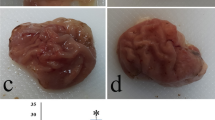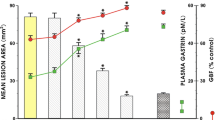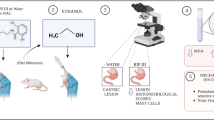Abstract
The purpose of this study was to elucidate themolecular mechanism of action of geranylgeranylacetone,an antiulcer drug. Treatment with ethanol for 8 hr atthe optimum concentration (7.5%) caused apoptotic DNA fragmentation in cultured guinea piggastric mucosal cells. Pretreatment of cells withgeranylgeranylacetone suppressed the DNA fragmentationin a dose-dependent manner. The maximum effect wasachieved at 10-6 M, at which concentration the drug waspreviously shown to induce heat-shock proteins. Thesuppression required an incubation period longer than 1hr. Pretreatment of cells with low concentrations of ethanol also prevented DNAfragmentation.
Similar content being viewed by others
REFERENCES
Murakami M, Oketani K, Fujisaki H, Wakabayashi T, Ohgo T: Antiulcer effect of geranylgeran ylacetone, a new acyclic polyisoprenoid on experimentally induced gastric and duodenalulcers in rats. Arzneimittelforschung 31:799-804, 1981
Fujimoto M, Yamanaka T, Bessho M, Igarashi T: Effects of geranylge ranylace tone on gastrointestinal secretion in rats. Eur J Pharmacol 77:113-118, 1982
Terano A, Shiga J, Hiraishi H, Ota S, Sugimoto T: Protective action of tetraprenylacetone against ethanol-induced damage in rat gastric mucosa. Digestion 35:182-188, 1986
Pappas TN, Mulvihill SJ, Goto Y, Debas HT: Advance s in drug Therapy for peptic ulcer disease. Arch Surg 122:447-450, 1987
Miller TA: Protective effects of prostaglandins against gastric mucosal damage: Current knowledge and proposed mechanisms. Am J Physiol 245:G601-G623, 1983
Terano A, Shiga J, Mutoh H, Hiraishi H, Shiina S, Kurita M, Ota S, Itoh Y, Sugimoto T: Protection against alcohol-induced gastric mucosal injury by geranylge ranylace tone: Effect of indomethacin. Dige stion 41:22-33, 1988
Bilski J, Murty VL, Nadzie jko C, Sarosiek J, Aono M, Moriga M, Slomiany A, Slomiany BL: Tetrapre nylace tone promote s healing proce ss of ethanol-induced gastric damage in The rat. Jpn J Pharmacol 55:115-120, 1991
Lindquist S: The heat-shock response. Annu Rev Biochem 55:1151-1191, 1986
Nakamura K, Rokutan K, Marui N, Aoike A, Kawai K: Induction of heat shock proteins and their implication in protection against ethanol-induced damage in cultured guinea pig gastric mucosal cells. Gastroenterology 101:161-166, 1991
Hirakawa T, Rokutan K, Nikawa T, Kishi K: Geranylgeranylacetone induces heat shock proteins in cultured guinea pig gastric mucosal cells and rat gastric mucosa. Gastroenterology 111:345-357, 1996
Mizushima T, Natori S, Sekimizu K: Relaxation of supercoiled DNA associated with induction of heat shock proteins in Escherichia coli. Mol Gen Gene t 238:1-5, 1993
Kane ko T, Mizushima T, Ohtsuka T, Kurokawa K, Kataoka K, Miki T, Sekimizu K: Co-induction of DNA relaxation and synthesis of DnaK and GroEL proteins in Escherichia coli by expression of LetD (CcdB) protein, an inhibitor of DNA gyrase encoded by the F factor. Mol Gen Genet 250:593-600, 1996
Mizushima T, Matsuo M, Sekimizu K: Induction of DnaK and GroEL proteins by fluoroquinolones in Escherichia coli. Antimicrob Agents ChemoTher 41:193-195, 1997
Kataoka K, Mizushima T, Ogata Y, Miki T, Sekimizu K: Heat shock-induced DNA relaxation in vitro by DNA gyrase of Esch erichiacoli in the pResence of ATP. J Biol Chem 271:24806-24810, 1996
Ogata Y, Mizushima T, Kataoka K, Kita K, Miki T, Sekimizu K: DnaK heat shock protein of Escherichia coli maintains the negative supercoiling of DNA against The rmal stRess. J Biol Chem 271:29407-29414, 1996
Higuchi H, Kurose I, Kato S, Miura S, Ishii H: Ethanolinduced apoptosis and oxidative stress in hepatocytes. Alcohol Clin Exp Res 20:340-346, 1996
Slukvin II, Jerrells TR: Different pathways of in vitro ethanolinduced apoptosis in thymocyte s and splenic T and B lymphocytes. Immunopharmacology 31:43-57, 1995
Rokutan K, Hirakawa T, Teshima S, Honda S, Kishi K: Glutathione depletion impairs transcriptional activation of heat shock genes in primary cultures of guinea pig gastric mucosal cells. Clin Invest 15:2242-2250, 1996
Robert A, Nezamis JE, Lancaste r C, Davis JP, Field SO, Hanchar AJ: Mild irritants prevent gastric necrosis through adaptive cytoprotection mediated by prostaglandins. Am J Physiol 245:G113-G121, 1983
Yajima N, Hiraishi H, Harada T: Protection of cultured rat gastric cells against oxidant stress by iron che lation. Role of lipid peroxidation. Dig Dis Sci 40:879-886, 1995
Rights and permissions
About this article
Cite this article
Mizushima, T., Tsutsumi, S., Rokutan, K. et al. Suppression of Ethanol-Induced Apoptotic DNA Fragmentation by Geranylgeranylacetone in Cultured Guinea Pig Gastric Mucosal Cells. Dig Dis Sci 44, 510–514 (1999). https://doi.org/10.1023/A:1026692920848
Issue Date:
DOI: https://doi.org/10.1023/A:1026692920848




